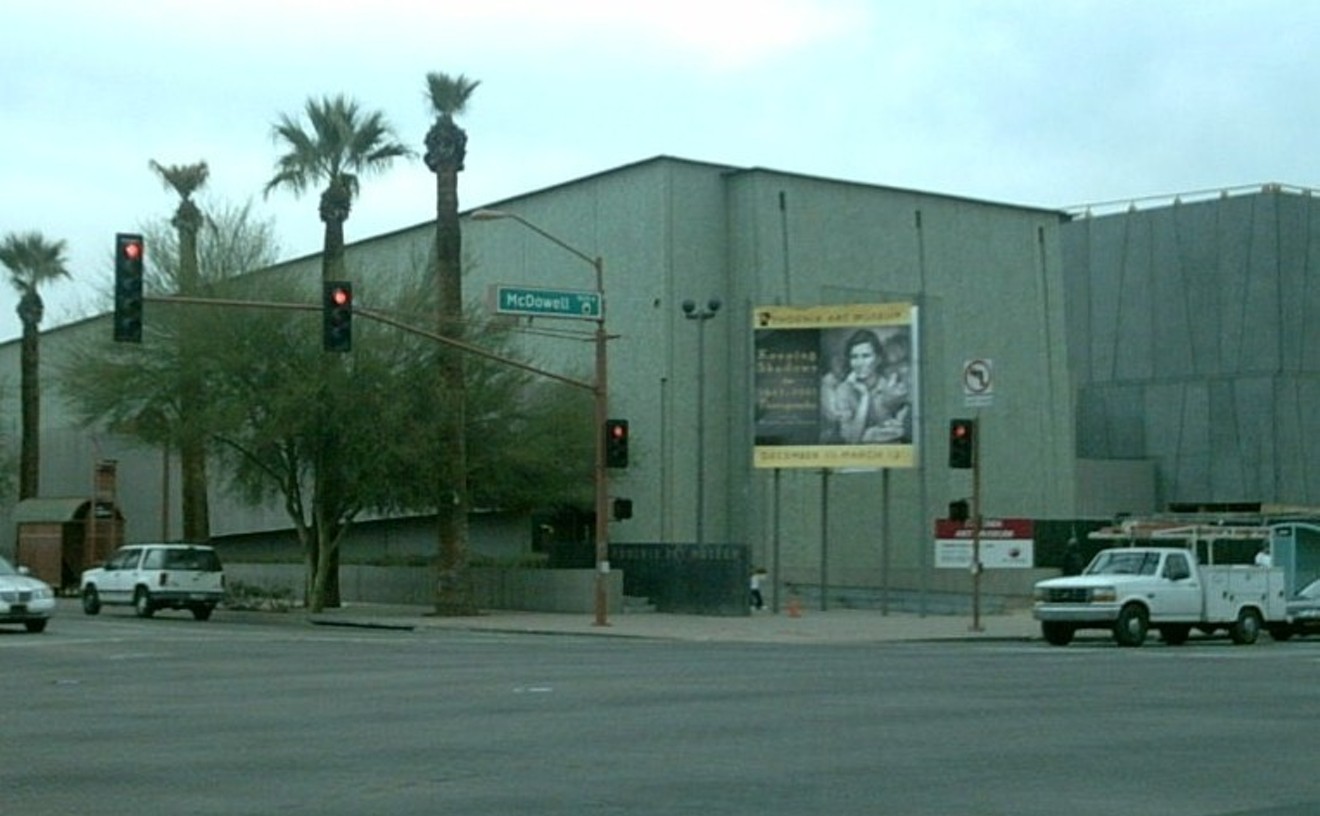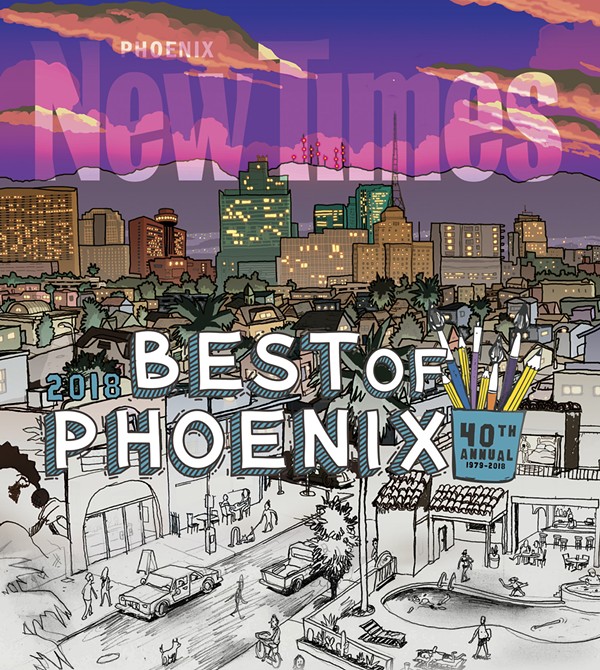Valley resident Scott Godlewski knows a thing or three about creating comics. For proof, load up the latest episode of The Illustrious Gentlemen podcast, where he and fellow artist Ryan Cody drop a dime every week on the inner workings of the sequential art industry, including how to make it in the biz. And Godlewski speaks from experience, considering he's been penciling and inking superheroes for major publishers like DC for going on a decade. (His all-too-brief stints on the post-Rebirth version of Superman and Batwoman are pretty great). Where he really shines is in the pages of Copperhead, the space Western yarn he co-created for Image Comics in 2014 with writer Jay Faerber. Godlewski's finely detailed lines and moody shading gives life to the homespun noir of a no-nonsense female sheriff grappling with mysterious circumstances on a backwater planet. The title's been an artistic and commercial success so far, earning him praise from both fans and critics alike. Way to go, Godlewski.
Best Poetry Open Mic
Caffeine Corridor
People may not think of Phoenix as a "poetry town," but there's been a thriving lit scene here for over a decade. Poetry slams, zine fests, Arizona State University literary conferences — there's something for everyone. If you're a writer looking for an open mic to share your work, woodshed some material, and meet fellow wordsmiths, you've got plenty of happenings to choose from. But if you really want to step up your lit game, you'll get your ink-stained butt over to Caffeine Corridor pronto. Hosted by scene vets Jack Evans, Shawnte Orion, and Bill Campana, Caffeine Corridor happens every second Friday of the month. It starts with an open mic and caps off with two feature sets. Some open mics pride themselves on being "page" poet events (for more academic verse and prose) while others put the focus on performances, but C.C. is the rare mic that welcomes both approaches. They usually book one featured poet each month from both camps, creating a varied and unpredictable evening of spoken word. They also book out-of-town features, making C.C. a great destination for being exposed to new work outside your community.
- 515 E. Grant St., Phoenix, 85004 Map
- 480-454-5929
- 9thegallery.com/
Best Equity Production
Chapter Two

This handsome production had its problems, like the fact that its principal cast bellowed most of their lines rather than simply speaking them. But this Chapter Two gave us the rare opportunity to watch a play directed by the woman who inspired it, one written by her ex-husband. Actress Marsha Mason, to whom the late playwright Neil Simon was married when he wrote Chapter Two — a play about a recent widower who marries a long-suffering divorcee — directed this version. Mason's fine cast included Davis Mason (no relation to Marsha), a charmer who brought a menu of emotions, each more sincere than the last, as well as the production's best performance.
- 222 E. Monroe St., Phoenix, 85004 Map
- 602-254-7399
- www.herbergertheater.org
Best Non-Equity Production
A Public Reading of an Unproduced Screenplay About the Death of Walt Disney
Playwright Lucas Hnath drags out some juicy Walt Disney legends in his caustic comedy — that old bit about Disney's head being cryogenically preserved, the one about lemmings being hurled from a cliff top during a nature documentary shoot. But it was iTheatre co-founder Christopher Haines's efficient direction and austere and practical set design that brought this work to life. Haines created the illusion of action from four players who are mostly sitting stock-still in office chairs in a showbiz pitch room. Hnath's staccato, overlapping dialogue and repetitive rhythms made a quagmire of half-finished sentences, but Haines and a fine cast created a startling homage to pathology and the dangers of egoism that deserved 90 minutes of our time.
Best Equity Performance
Katie McFadzen in A Christmas Carol
Only Katie McFadzen could pull off playing bitchy Mrs. Cratchit, sickly-sweet Tiny Tim, and that blowhard Ghost of Christmas Present, while also making something of Charles Dickens' 173-year-old narration in a one-woman production of A Christmas Carol. McFadzen adapted the script herself, from the original text, with the help of director Matthew Wiener. It played last winter at Tempe Center for the Arts, and was way more than a recitation, even while it quoted great hunks of the Dickens novella. Rather than inhabit each character, McFadzen described them with distinct voices and slightly altered stature — a subtle trick that elevated this 80-minute adaptation, turning a how-did-she-do-that curiosity into a tidy entertainment.
Best Non-Equity Performance
Jeffrey Middleton in The Best Man
The Best Man is a long, talky peek behind the scenes of a presidential primary in 1960 Philadelphia. Gore Vidal's preachy play can be a snooze, but Compass Players wedged a nice production onto the stage of Peoria Center for the Performing Arts last winter. At its center, a pair of presidential candidates duke it out for a top political spot, but audiences were distracted, in this production directed by the late Jeanna Michaels, by actor Jeffrey Middleton, who should not be allowed on any stage where other performers are meant to be seen. Here, he was a campaign manager named Blades, equal parts Wallace Beery and Daddy Warbucks, who stomped through every scene, chewing scenery and waving his arms and radiating comedy even in repose. While our memories of the other performances in this and other plays might fade, Middleton's scene-stealing Blades lingers on.
Best Dance Festival
Breaking Ground
Now an annual dance tradition, Breaking Ground pairs high-quality contemporary dance performance and dance films to reveal and punctuate the breadth and depth of contemporary dance in and beyond metro Phoenix. It's the brainchild of Carley Conder, artistic director for CONDER/dance. Conder founded the festival back in 2008, and it's still going strong. Breaking Ground 2018 was particularly powerful, because so many of its choreographers captured the zeitgeist at play both within and beyond the world of dance — including the focus on women's agency over their own bodies, emotions, ideas, and actions. For a dance community that lacks resources, even as it competes with big-budget entertainment, the festival reminds Phoenix audiences of the talent in our own midst, but also encourages choreographers, dancers, and other creatives to innovate and grow in new directions.
Best Dancer
Jenny Gerena
All eyes were on the #MeToo movement this year, raising women's voices against sexual abuse and the systems that help to perpetuate it. Into that ethos, choreographer, dancer, and photographer Jenny Gerena injected a new dance work called Woman, Do You Fear?, which premiered at the 2018 Breaking Ground dance festival at Tempe Center for the Arts. Inspired in part by the instincts of wolves, it explored "feminist perspectives on dominance, protection, solitude, and solidarity" within the context of women's freedom and support for fellow women. For the first BlakTina Dance Festival in Phoenix, she performed Self-Portrait of a Dying Soul, which gave voice to the death grip of dominant culture on women of color. Gerena uses the female body, including her own dark, free-flowing hair, to write the poetry of women's strength and solidarity through movement.
Best Choreographer
Nayon Iovino of Ballet Arizona
Nayon Iovino knows his way around neurons. They're the brain cells that receive, process, and transmit information. And they're all about connectivity, which inspired Iovino's Threads, a new dance work that premiered during Today's Masters, performed by Ballet Arizona at the Orpheum Theatre in March. He's danced with the company since 2012. And he's choreographed more than 10 new dance works featured in Ballet Arizona seasons since then, starting with Inner Layer in 2014. Like Ib Andersen, artistic director for Ballet Arizona, he's a master at blending classical and contemporary ballet — infusing works with humor and drama to channel the mysterious complexities of connections within the human psyche even as he explores the connections forged between one person and another.
Best Edible Art
Push Pull by Valeska Soares

The word "interactive" had become a buzzword in contemporary art, used far too frequently for art that doesn't deliver on that promise. But that's not the case with works by Valeska Soares, whose "Any Moment Now" exhibition at Phoenix Art Museum included the periodic temporary installation of sculptural pieces made with taffy. On Saturday, March 24, for example, a trio of large taffy pieces hung from three metal poles placed near the entrance to the exhibition, constantly formed into new shapes by gloved museum professionals who offered small pieces to onlookers. Each sculpture, created in collaboration with New York-based Kreëmart, had a different color, aroma, and taste — created by pairing flavors such as blood orange, bergamot, and lavender. Plenty of conceptual conversations revolve around consuming art, but Soares gave the issue a new twist with works that could actually be chewed, swallowed, and digested by museum visitors. Talk about being one with the art.
- 1625 N. Central Ave., Phoenix, 85004 Map
- 602-257-1880
- www.phxart.org





